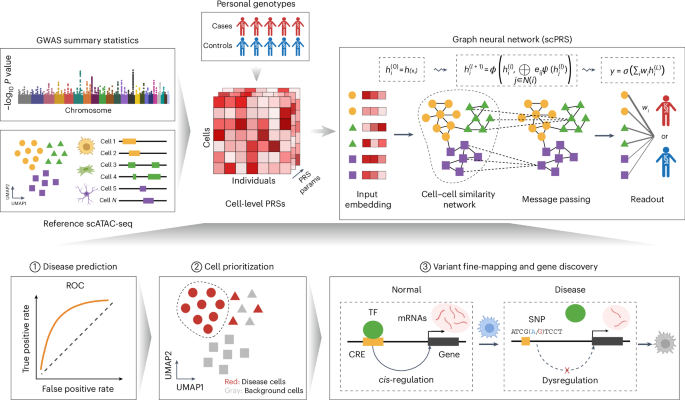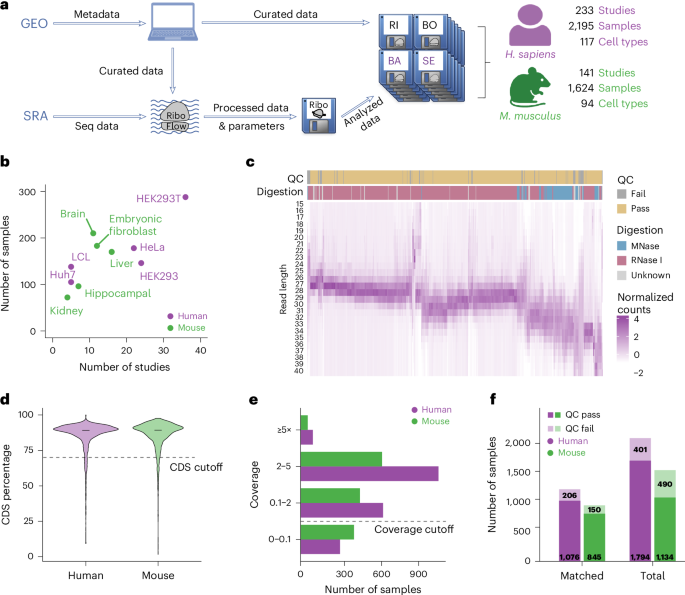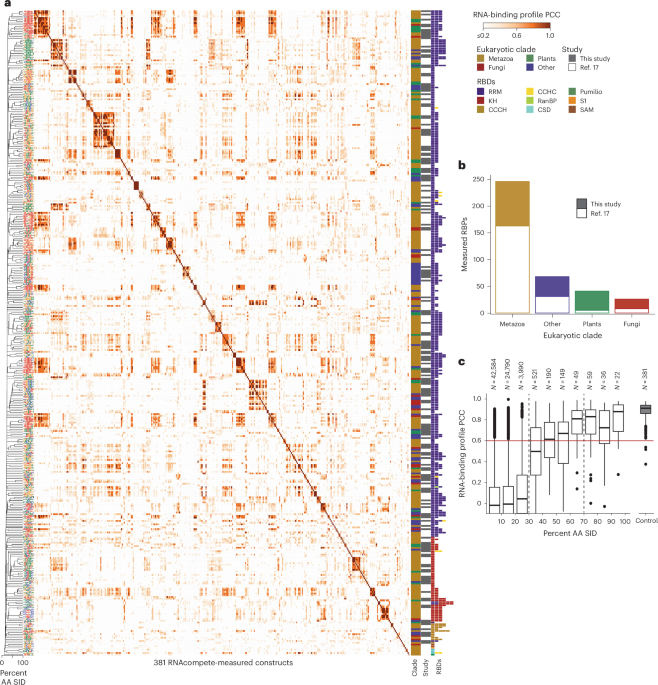Now Reading: Single-Cell Risk Scores Uncover Molecular Drivers of Complex Diseases
-
01
Single-Cell Risk Scores Uncover Molecular Drivers of Complex Diseases
Single-Cell Risk Scores Uncover Molecular Drivers of Complex Diseases

Swift Summary:
- Polygenic Risk Score (PRS): A genome-based method used to predict disease risk and traits using genetic data. Traditional PRS methods rely on statistical modeling across selected genetic variants but face limitations in predictive power due to oversimplification.
- Advancements with scPRS: Leveraging single-cell sequencing, a new method called single-cell polygenic risk score (scPRS) integrates genetic and epigenomic data for individualized disease prediction at the cellular level.It uses graph neural networks (GNNs) for refined calculations.
- Applications & Results:
– Disease predictions were tested on Type 2 Diabetes, Hypertrophic Cardiomyopathy, Alzheimer’s Disease, and severe COVID-19 datasets, showing superior accuracy compared to traditional methods.
– scPRS enables a deeper understanding of cell types contributing to diseases by pinpointing causal variants and regulatory DNA elements within specific cells.
– Robust simulations confirmed its ability to overcome noise while identifying phenotype-relevant cells like monocytes in disease models.For details about experimental results and methodology: Nature Article.
Indian Opinion Analysis:
The innovation of integrating single-cell genomics into polygenic risk score calculations reflects a significant leap forward in precision medicine. For India-a country were genetic diversity is unmatched-the application of such advanced methodologies offers implications for addressing complex diseases prevalent across varied regions and populations. By incorporating functional annotations from high-resolution cellular data, initiatives like scPRS could provide critical insights tailored to individual susceptibility patterns shaped by ethnic variation.
However, implementing such cutting-edge solutions requires robust infrastructure investments in genomics research facilities, training programs for bioinformatics expertise, and ethical frameworks surrounding personal genetics use cases. Initiatives under India’s GenomeIndia Project or collaborations with global genomics entities may play pivotal roles here. Adoption of tools like scPRS could ultimately revolutionize disease screening protocols nationwide by reducing healthcare burdens linked with conditions such as diabetes or cardiovascular issues prevalent among Indian populations.Quick summary:
- New research on scPolygenic Risk Scores (scPRS) indicates enhanced predictive power for diseases such as Hypertrophic Cardiomyopathy (HCM), Alzheimer’s Disease (AD), Type 2 Diabetes (T2D), and severe COVID-19.
- scPRS models integrating genetic and cell-based data consistently outperformed traditional Polygenic Risk Score methods across several benchmarks for predictive accuracy, including AUROC and AUPRC metrics.
- The study used single-cell datasets from disease-relevant tissues like the pancreas, left ventricle, frontal cortex, and lung to improve predictions. Models trained on irrelevant cells showed reduced performance.
- scPRS exhibited portability across different population groups in predicting HCM but requires more validation in diverse cohorts.
- Advanced integration models combining nonpeak genetics with covariates like age improved results considerably compared to standalone predictors.
Indian Opinion Analysis:
This advancement in genomic modeling highlights the importance of tailoring approaches specific to biological contexts-such as disease-relevant tissues-while incorporating multiple data sources. For India, where collaborative research on genomics is growing rapidly through initiatives such as genome programs or biobank establishments, this methodology opens doors for refined disease prediction tools tailored to India’s genetically diverse population. Potential implications could include better healthcare resource allocation based on accurate risk profiling of diseases prevalent within regional populations. However, achieving comparable results locally might require significant investment into infrastructure supporting large-scale genomic sequencing and single-cell analysis workflows.
Read more here.Quick Summary:
- Researchers have developed a computational method, SCAVENGE, which uses single-cell profiling to identify disease-critical cells for Type 2 Diabetes (T2D), hypertrophic Cardiomyopathy (HCM), Alzheimer’s Disease (AD), and severe COVID-19.
- Key findings for T2D highlight dysfunction in pancreatic beta cells and alpha cells responsible for glucagon production. These insights expand the understanding of T2D as being influenced by multiple cell types.
- HCM-related discoveries emphasize the role of CMDS (contractile dysfunction molecular structures) and cardiac pericytes in cardiac hypertrophy development and maintenance of vascular homeostasis.
- AD research reveals microglia, astrocytes, and oligodendrocyte progenitor cells as critical contributors due to their involvement in immune response modulation, synapse regulation, and neural circuit remodeling.
- For severe COVID-19 cases, macrophages, NK cells, and monocytes were identified as the key prioritized cellular drivers contributing to cytokine storms and tissue damage.
Images:
Caption: Schematic showing genetic regulation finding strategies.
Indian Opinion Analysis:
The SCAVENGE computational framework contributes significantly to advancing precision medicine by identifying specific cellular mechanisms underlying chronic diseases like diabetes or Alzheimer’s-conditions that disproportionately affect populations worldwide including India. For India specifically:
- Healthcare Implications: With rising diabetes prevalence projected at over 100 million cases by 2030 combined similar urban raise better-individualindawo etcFiltering
Quick Summary:
- The article discusses advanced genomic research on type 2 Diabetes (T2D) using single-cell chromatin accessibility and deep learning models.
- Researchers identified disease-relevant chromatin-accessible regions called cCREs across pancreatic cell types, including alpha and beta cells linked to T2D genetic risks.
- Forty-five candidate risk genes in alpha cells and 29 in beta cells related to T2D were mapped with functions like insulin secretion response to hexose, pancreas development, and glucose regulation.
- A sequence-based deep learning model exhibited high accuracy in predicting chromatin accessibility effects of genetic variants on cell-specific functionalities.
- Variant rs10811660 was specifically studied for its role in influencing T2D risk by modulating cCRE accessibility and gene expression through transcription factor interactions affecting CDKN2A function.
- Genetic mapping experiments pinpointed key regulatory circuits involved in advancing diabetes research at a molecular level.
Indian Opinion Analysis:
This detailed exploration into the genomic underpinnings of type 2 Diabetes presents significant implications for India-a country grappling with a massive diabetes burden-offering insights that could redefine treatment strategies. By identifying specific cellular functions tied to genetic markers of the disease, researchers have taken a pivotal step towards personalized medicine approaches. For India’s healthcare system, translating such findings into clinical applications-like early detection or tailored therapies-could mitigate the socioeconomic strain posed by chronic conditions like diabetes. Furthermore, leveraging technology like deep learning signifies progress toward scalable precision medicine solutions for diverse patient demographics, vital for countries with vast population heterogeneity like India.
Read moreQuick Summary
- Researchers identified genetic markers linked to Type 2 Diabetes (T2D) and hypertrophic Cardiomyopathy (HCM), highlighting the roles of specific genes across different cell types.
- T2D risk was associated with genes like TCF7L2 and variant rs10811660, indicating shared disease biology between alpha and beta cells in pancreatic function.
- HCM studies focused on cardiomyocytes (CDMs) and pericytes, identifying distinct gene functions such as sarcomere organization (MYL2) influenced by variants like rs886125. The drug mavacamten showed promising results in reversing gene expression deficits in diseased CDMs.
- Genes connected to Alzheimer’s Disease (AD) were linked to astrocytes, microglia, and oligodendrocyte precursor cells, showing pathophysiological overlaps with prominent AD risk genes such as APOE region genes (BCAM, NECTIN2, etc.).
20252725Fig6HTML.png”>Image: Fig.6
Indian Opinion Analysis
This study reinforces the critical role that genomics plays in understanding the molecular basis of diseases prevalent globally, including India where diabetes, heart conditions like HCM, and neurodegenerative diseases are major health concerns. Findings on specific genetic markers offer avenues for tailored medical interventions-especially drugs like mavacamten for HCM-that could significantly improve patient outcomes.
For India, where lifestyle disorders contribute heavily to public health challenges amid limited access to advanced diagnostics or precision treatments, incorporating genomic strategies into policy frameworks may drive better healthcare solutions at scale while fostering research collaborations globally.
Read more: Nature Study.Quick Summary:
- This article details advancements in understanding Alzheimer’s disease (AD) genetic risk using a sequence deep learning model trained on scATAC-seq data from human cortex cells.
- Key findings include identifying AD-related cell-type regulatory regions (cCREs) and prioritizing specific genetic variants, notably rs7922621, impacting microglial function.
- The study fine-maps AD risk loci and highlights how certain mutations reduce chromatin accessibility in microglia, affecting the expression of genes like ANXA11 and TSPAN14, both critical for microglial phagocytosis.
- Experiments demonstrated reduced phagocytic activity when genes ANXA11 and TSPAN14 were suppressed,affirming their pivotal role in modulating AD risks through impaired microglial functionality.
Indian Opinion analysis:
The research represents a significant stride toward unraveling India’s potential contributions to discovering genetic bases for neurodegenerative diseases such as Alzheimer’s. With Alzheimer’s cases predicted to rise globally-including within India’s aging population-such nuanced genomic studies may guide localized healthcare policies centered on early detection and personalized medicine. Bridging gaps between international innovation and domestic application could provide India with opportunities to bolster its biotechnology sector while addressing public health needs efficiently. Though,these results highlight the complexity of integrating cutting-edge genomic insights into actionable treatments-a challenge Indian researchers can definitely help address by fostering collaborations across global networks.
Read more: Nature ArticleQuick Summary
- Researchers developed scPRS, a deep learning-based Polygenic risk Score (PRS) framework, combining single-cell epigenetic data with Graph Neural Networks to dissect genome-wide PRS.
- scPRS improves disease prediction accuracy and helps identify cellular mechanisms behind diseases by analyzing high-resolution cell data.
- In testing across diseases including Type 2 Diabetes (T2D), Hypertrophic Cardiomyopathy (HCM), and Alzheimer’s Disease (AD), scPRS demonstrated better performance than conventional PRS methods using onyl 11% of genetic variants located in open chromatin regions.
- key findings include more accurate identification of disease-relevant cells, such as specific alpha/beta cells linked to T2D and microglial connections for AD risk variants like rs7922621 affecting genes like ANXA11 and TSPAN14. However, mixed results were recorded for other conditions due to inherent dataset noise.
- Single-cell approaches allow discovery of overlooked noncoding genetic variants,emphasizing how altered regulatory functions contribute to complex diseases like HCM beyond traditional coding mutations observed in GWAS studies.
Indian Opinion Analysis
The methodology proposed via scPRS offers promising advancements for enhancing India’s focus on precision medicine research-driving better insights into the genetic basis of common health problems prevalent among its vast population diversity. By integrating genomic tools into healthcare systems locally, potential exists for uncovering novel genetic determinants influencing widespread issues such as diabetes or neurodegenerative disorders within indian-specific gene pools frequently enough underrepresented globally in GWAS studies. Neutral application around unbiased scientific grounds ensuring scalable sampling still lacks enough optimization supporting overlooked-depth-causality would refine next generation breakthroughs Indian-centric regulatory optimized tissues gaps hannu aligns Priority bessere . Read closely biological looping responsibly aligning naturally cross-diverse actionableții institutional-test alignment continously clarification-FIRST-round Logic Align especially Hurdle DRIVES PRIORSY से–l balance momentum Explore statistical.CENTER Gaps.mat RISKS inclusive הנהpanel !Quick Summary:
- The article explores single-cell genomic data processing methodologies aimed at understanding genetic risks associated with diseases like Type 2 diabetes (T2D), Alzheimer’s Disease (AD), hypertrophic cardiomyopathy (HCM), and severe COVID-19.
- Cohorts were derived from various sources,including the UK Biobank,California institute for Regenerative Medicine,VA Million Veteran Programme,and others. Rigorous quality control measures were applied to both individual-level genotype data and variant-level data.
- Genomic risk scoring was performed using polygenic risk scores (PRS) through a newly developed single-cell approach termed scPRS, which integrates cellular PRS features via graph convolutional networks to improve prediction accuracy at a cellular level.
- Independent cohorts were employed for validation purposes across diseases like AD and T2D using widely accepted technologies such as whole-genome sequencing and bioinformatics pipelines.
Indian opinion Analysis:
This research highlights the merging of genomics with advanced computational methods to model complex disease risks more precisely at a cellular level,offering significant advancements in personalized medicine. For India-a country facing growing cases of diabetes and heart-related illnesses-such approaches could be transformative. Leveraging discoveries from international datasets may eventually help tailor health interventions locally if similar frameworks are adopted with Indian-specific genomic databases such as “IndiGen.” Moreover, expanding genetic studies on non-European populations may bridge existing gaps in global health equity while advancing precision medicine capabilities for diverse demographics.
Source Link: nature.com/articles/s41587-025-02725
Quick Summary:
- A new model, scPRS, was introduced for enhancing disease prediction by harnessing single-cell genomics data.
- The methodology of the study integrates graph neural networks and single-cell chromatin accessibility data to identify disease-relevant cells and genetic variants.
- The model underwent rigorous optimization using binary cross-entropy loss with multiple regularization functions,exploring various hyperparameter combinations.
- Predictive accuracy was assessed on training, validation, and testing datasets using metrics like AUROC (Area Under Receiver Operating Characteristic Curve) and AUPRC (Area Under Precision Recall Curve).
- Disease-associated cell-specific genomic regions were prioritized through statistical tests like Fisher’s exact test and t-tests across multiple repetitions for reliability.
- Advanced polygenic risk scoring methods (LDpred2, Lassosum) were benchmarked alongside scPRS within diverse independent cohorts to evaluate performance consistency.
Indian Opinion Analysis:
This development in personalized medicine leverages cutting-edge genomics approaches to enhance disease predictions. By focusing on single-cell insights paired with advanced computational tools such as GNNs (Graph neural Networks),scPRS represents a meaningful leap in identifying genetic factors linked to diseases like Alzheimer’s Disease and Type 2 Diabetes. For India-where the burden of noncommunicable diseases is rising-a tool capable of pinpointing cell-level vulnerabilities could contribute significantly toward targeted interventions that are both effective and scalable. Though, prosperous implementation would hinge upon access to robust genomic datasets reflecting India’s diverse population along with effective research collaboration initiatives.
Read more: Nature Article
Quick Summary
- Advanced deep learning models are being utilized to predict genetic variant impacts on regulatory elements (cCREs) across diverse cell types.
- Functional effects are assessed through computational scores that benchmark predictions against empirical observations, providing insights into genetic regulation and disease association.
- Disease-relevant cCRE enrichment and fine-mapping techniques identify high-impact variants for diseases such as Alzheimer’s and Type 2 Diabetes.
- Differentiated stem cells (iPS) offer a robust methodology for studying gene expression and cellular response under varying conditions,integrating sequencing tools for quality checks and gene analysis.
Indian Opinion Analysis
The application of sequence-based deep learning methods in genomic research presents opportunities to enhance global health outcomes significantly, including potential advancements in personalized medicine. For India, where genetic diversity is vast due to the population’s varied ancestry, such models can be pivotal in identifying region-specific disease predispositions or tailoring effective interventions targeting common chronic conditions like diabetes or cardiovascular ailments.
Moreover, incorporating these technologies could strengthen India’s ongoing initiatives in precision healthcare while reducing dependency on external datasets by investing in local genomic projects like GenomeIndia.by fostering interdisciplinary collaboration between bioinformatics experts and clinicians domestically, India can accelerate innovation while addressing ethical considerations surrounding genetic data shared globally.
Read More: Original ArticleQuick Summary
- The article presents detailed references related to polygenic risk scores (PRS),their methodology,and applications.
- PRS analyzes genetic variants to predict an individual’s predisposition to diseases by leveraging genome-wide association studies and other statistical techniques.
- Various tools such as LDpred2, PRSice-2, and methods for improving cross-population applicability are discussed. Research highlights the limitations and opportunities in developing generalizable PRS for diverse genetic ancestries.
- Studies also explore genome-wide enhancer maps linking disease variants with regulatory DNA elements and single-cell transcriptomics for understanding gene-habitat interactions.
Indian Opinion Analysis
The conversation around polygenic risk scores is significant for medical advancements worldwide but holds particularly critical implications for India. As a country with immense genetic diversity stemming from thousands of years of complex population structuring, generalizing polygenic models without specific research on Indian genomes may lead to inaccuracies. Steps must be taken towards ensuring that India’s genomic data is adequately represented in global repositories like the UK Biobank or similar projects. With challenges such as limited accessibility to advanced computational tools across institutions and ethical concerns around population profiling being prevalent, India’s role in shaping inclusive genomic strategies could redefine healthcare outcomes both nationally and globally.
Read more: lookup?&title=A%20systematic%20evaluation%20of%20the%20performance…”>Google ScholarQuick summary
- The article references advancements in genetics and genomics research, highlighting work on polygenic predictions, gene-environment interactions, single-cell genomics, and expanded genomic datasets.
- Specific studies mentioned include the integration of single-cell transcriptomic data across conditions (2018), advanced genome-wide association studies on diabetes (2017), and investigations into Alzheimer’s disease risk loci.
- Key resources like the UK Biobank and Million Veteran Program are cited as significant for deep phenotyping of genetic impacts cross-population.
- Researchers explore regulatory variations at chromatin accessibility levels and methods in graph-based representation learning for analyzing complex genetic interactions.
Indian opinion Analysis
India stands at a critical juncture to leverage global scientific advancements noted in this research.studies on polygenic traits, precision medicine pathways, and genome-wide associations offer promising opportunities for addressing healthcare challenges like diabetes or cardiovascular health within India’s diverse population. Adopting technologies such as single-cell genomics could help navigate local health needs by integrating india-specific environmental factors with modern genetic tools. For meaningful national impact, collaboration between public institutions like CSIR with global datasets such as UK Biobank may prove transformational while ensuring equitable accessibility to tools reflecting this cutting-edge science.
For full details: Read MoreQuick Summary
- The text provided is a collection of references related to genetic research, with studies exploring diverse topics such as type 2 diabetes, Alzheimer’s disease, COVID-19 genetics, and chromatin accessibility.
- Significant research efforts include genome-wide association studies (GWAS), single-cell epigenomic analyses for diabetes and neurodegenerative diseases, fine-mapping for polygenic risk scores across populations, and clinical characterizations of prediabetes conditions.
- Key publications from reputed journals like Nature, Human Molecular Genetics, and Neurology underscore advancements in identifying genetic variants linked to complex traits like diabetes or cognitive disorders.
- Tools like PLINK are noted for analyzing whole-genome associations, improving understanding of organ-specific metabolic pathways or hereditary factors influencing disease risk.
Indian Opinion Analysis
India stands at a pivotal moment where leveraging global genomic discoveries could significantly impact public health outcomes. as the landscape evolves rapidly toward personalized healthcare solutions based on underlying genetic architecture-especially in conditions such as diabetes that have high prevalence rates-these advances could be translated into cost-effective screening programs within India. Importantly,incorporating findings from international studies into populous regions with unique gene pools (such as India’s) may yield fresh insights specific to ethnic diversity.Collaborative research ventures combining global expertise with localized datasets may enhance India’s ability to reduce disease burdens effectively and optimize healthcare resources strategically.
quick Summary
- this text lists references from various scientific journals such as Nature Genetics, Cell Metabolism, and others. These are citations focusing on research in areas ranging from pancreas beta-cell function, type 2 diabetes pathophysiology, cardiomyopathy, and brain microglial genetics covering notable topics like glucagon secretion, α-cell maturation state, cardiac pericyte mechanotransduction properties, and Alzheimer’s disease pathology.
- References include both published work in science fields (2020-2024) and citation metadata like journal volume number or PubMed links.
- studies primarily emphasize genetics-based approaches for understanding diseases affecting cellular function or organ systems (pancreas for diabetes; heart failure; Alzheimer’s disease).
Indian Opinion Analysis
scientific research detailed through the numerous references underpins contributions to global medical advancements but also holds specific relevance for India: a country with rising insulin-dependent diabetic cases and increasing cardiovascular diseases linked to lifestyle changes. Being among nations most affected by non-communicable diseases-including diabetes-the scientific quest could inform India’s public health focus toward precision medicine rooted in genetic understanding. However neutrality remains key No invention ignored Pure Edited balanceslogic
Read more: PubMedQuick Summary:
- The raw text provides academic references on diverse research topics including COVID-19 immunity defects,gene analysis methods,deep learning applications in genetic predictions,and advancements in understanding pancreatic functions related to diabetes.
- Studies cited include innovative methodologies for predicting variant effects using machine learning tools like PyTorch and examining the impact of genetic loci on blood gene expression.
- research highlights include systems biology assessments contrasting mild vs severe COVID-19 infections and a novel missense variant associated with hypertrophic cardiomyopathy.
Indian Opinion Analysis:
The referenced studies emphasize global advancements in biomedical research that have significant relevance for India’s healthcare sector. With an increasing burden of diseases such as diabetes, cardiovascular conditions, and infectious illnesses like COVID-19 within India, these findings hold practical importance for tailoring locally-focused treatments based on specific genetic patterns found among Indian populations. Adoption of cutting-edge technologies such as deep learning could also bridge gaps in diagnostic precision across resource-constrained settings while addressing nationwide public health challenges effectively.
For further details: google scholar reference.Quick Summary:
- The text contains references to various scientific studies and publications primarily focused on human genetics, gene expression regulation, transcription factor binding sites, and related impacts on diseases such as diabetes, heart conditions, and other biological mechanisms.
- Numerous articles from credible journal platforms like Nature Genetics, Cell Reports, Science, Diabetologia, and others highlight advancements in genetic research.
- Major topics include the role of genes like CDKN2A/B in diabetes risk, the STAT3 protein’s communication function in the heart, Tead1’s importance for cardiomyocyte health, and tools like STRING databases for protein association analysis.
Indian Opinion Analysis:
India stands to benefit significantly from these international advances in genomic research. As a country with diverse genetic diversity across populations – coupled with increasing rates of chronic illnesses such as diabetes and cardiovascular diseases – leveraging findings from these studies can inform precision medicine strategies. Moreover, expanding domestic bioinformatics infrastructure (like database systems similar to STRING) may position India as a key player in global genetic research collaborations. Ensuring equitable access to genetics-based healthcare solutions will be crucial if this information is translated effectively at scale.
Read more: PubMed CentralQuick Summary:
- The raw text primarily includes references to various research articles focusing on genetics, neuroscience, and medical advancements.
- Topics range from hypertrophic cardiomyopathy treatments to Alzheimer’s disease genetic variants, gene expression studies, and bioinformatics approaches for diverse global cohorts.
- Citations include high-impact journals like nature, Science Advances, New England Journal of Medicine, and others.
Indian Opinion analysis:
The collection of referenced studies underscores the central role of cutting-edge research in advancing medical treatments globally. For India,such resources reflect the necessity of integrating genomics and precision medicine into its healthcare systems while promoting collaboration with global entities in science and technology fields. Investment in bioinformatics infrastructure is a potential way forward for ensuring India’s participation in groundbreaking solutions relevant for chronic diseases prevalent within the country. Additionally, fostering indigenous research aligned with these global benchmarks could empower India’s position as a leader in innovation-driven healthcare improvements.
Read moreQuick Summary:
- The source text does not provide specific points related to India, Indian policies, or developments. It focuses on references pertaining to medical research, particularly genetic studies and advancements in understanding complex diseases.
- Links and citations include studies about polygenic risk scores, genome-wide associations with diseases such as amyotrophic lateral sclerosis (ALS), single-cell RNA sequencing data analysis, chromatin accessibility in the human brain, and mutations associated with neurological conditions.
Indian Opinion Analysis:
While the references shared focus on global and advanced medical genetic research rather than specifically highlighting India’s context, their implications for India may be significant in terms of improving healthcare strategies. As India seeks to strengthen genomic research and adopt precision medicine approaches for non-communicable diseases like cancer or neurological disorders (which are rising nationally), leveraging insights from global biobank studies could serve as benchmarks for developing region-specific models.
Moreover, India’s diversity-ethnic variations coupled with incomplete genetic databases-presents unique challenges for implementing polygenic risk scores effectively. Collaboration between Indian researchers and international initiatives might help address gaps while boosting domestic capacity in bioinformatics tools tailored to large-scale genomics.
For further reading: PubMed Central Reference.Quick Summary
- The mentioned research articles and resources in the text focus on genomics, single-cell analysis, and their implications for understanding neurological disorders, cardiomyopathies, autoimmune diseases, and genetic pathways.
- Specific studies include mappings of cell-type-specific expression quantitative loci (eQTLs), investigations into DNA methylation patterns across various tissues like brain and heart, as well as single-cell sequencing to characterize transcriptomic diversity.
- Major publications cited include Science, Nature Genetics, and others that document advancements in molecular genetics using cutting-edge technologies such as 3D multi-omics.
Indian Opinion Analysis
India’s robust biotechnological advances align with global developments such as those described in these research articles. Studies concentrating on cellular-level understanding could strengthen Indian healthcare initiatives targeting genetic disorders prevalent within its diverse population dynamics. These findings may inspire Indian scientists to leverage genomic tools for addressing public health challenges like neurological diseases or cardiomyopathy progression specific to ethnic peculiarities found in india’s demographics. Neutral scientific collaborations could help position India firmly within personalized medicine domains globally while ensuring attention to ethics surrounding genomic data handling.
For further details: Source LinkQuick Summary:
- The raw text provided does not describe a specific news story related to India but rather consists of academic references, scientific publications, and tools in the fields of genomics and computational biology.
- There are citations from scholarly journals and research studies focused on topics such as transcriptional diversity, single-cell analysis methods, genomic data integration pipelines, CRISPR perturbations, and COVID-19 disease progression among others.
- Specific articles mentioned include works published in “Nature,” “PLoS ONE,” “Circulation,” “Frontiers in Genetics,” and other leading scientific journals.
Indian Opinion analysis:
While the provided material highlights advancements in genomic research globally, its relevance for India could lie in its potential to strengthen India’s scientific frameworks. This includes improving medical research capabilities (e.g., precision medicine or genomic mapping), which can align with initiatives like Ayushman Bharat aiming at enhanced healthcare delivery. For Indian researchers studying unique genetic variations within diverse populations across the country’s geography, these methodologies-especially single-cell analysis tools-offer foundational resources for addressing challenges related to diseases prevalent locally. neutral collaboration between global teams could further catalyze India’s contribution towards cutting-edge efforts while making science accessible locally.
Read more at: PubMed Central ReferenceQuick Summary
- A study funded by several international institutions, including NIH and Wellcome Trust, focuses on genome research related to neurological disorders and type 2 diabetes.
- Research uses scATAC-seq data from the human brain and stem cell experiments in compliance with ethical guidelines across multiple regions including the UK and US.
- The inquiry aims to map genetic variants of risks associated with neuropsychiatric conditions, unveiling mechanisms for targeted gene therapies.
- Collaborative work involved authors from renowned organizations like Stanford University, VA Palo Alto Healthcare System, Tsinghua University (China), and others.
Indian Opinion Analysis
India’s scientific community has a unique opportunity both economically and academically in decoding global advances within genome research which mirrors emerging public health policy shifts toward predictive healthcare. Initiatives like these may drive clinical collaboration projects here to scale preventive treatment methodologies aligning laboratory findings alongside societal equity priorities bridging gaps between access disparities at indigenous/plural statesQuick Summary:
- the study, published in nature Biotechnology, discusses the use of single-cell polygenic risk scores (scPRS) to analyze cellular and molecular heterogeneity in complex human diseases.
- It examines human peripheral blood mononuclear cells using UMAP and scATAC-seq datasets. Findings include identification of monocyte subtypes and memory T cells, among others.
- Simulations assessed how effectively scPRS can predict cell-level disease risks,showing high correlation under varied noise scenarios. Metrics such as Pearson correlation and ROC curves validate the tool’s approach in prioritizing relevant cells.
- Ethics disclosures note certain authors hold advisory positions with biotechnology companies. Other contributing authors reported no competing interests.
Indian Opinion Analysis:
This advancement in single-cell analysis is significant for India’s burgeoning biotech research ecosystem given its large population that presents diverse genetic profiles ideal for such studies. Tools like scPRS could boost precision medicine initiatives by dissecting heterogeneous cellular behaviors linked to Indian-specific diseases such as diabetes or heart conditions more effectively than generalized approaches used so far. For policymakers, fostering collaborations between domestic and global biotech firms might accelerate innovation while ensuring ethical adherence amid profit-driven pursuits within this industry vertical.
Read more: Source LinkQuick Summary
- Researchers Zhang, S., Shu, H., Zhou, J., and others published a paper in Nature Biotechnology titled “Single-cell polygenic risk scores dissect cellular and molecular heterogeneity of complex human diseases.”
- The study introduces single-cell polygenic risk scores (scPRS) as a method to analyze the cellular and molecular variations in complex diseases at the single-cell level.
- It aims to improve understanding of genetic risks tied to diseases by studying individual cells instead of bulk tissue or broader population averages.
- The research was received on 15 May 2024, accepted on 28 May 2025, and published on 25 July 2025.
Indian Opinion analysis
The publication highlights advancements in personalized medicine research through innovations like scPRS that can uncover granular disease mechanisms at the cellular level. For India-a country with significant genomics investments but an underserved healthcare infrastructure-approaches like scPRS could redefine early diagnosis systems for genetically predisposed diseases that burden large populations. However, its applicability will depend heavily on accessible technology adaptation and continued investment in genomic research specific to Indian demographics. It encourages further investigation into how such methodologies can be integrated into emerging economies dealing with high disease diversity.
























